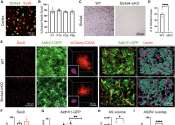New CRISPR screening method could reveal what drives brain diseases
The brain is often referred to as a "black box"—one that's difficult to peer inside and determine what's happening at any given moment. This is part of the reason why it's difficult to understand the complex interplay of ...
May 20, 2024
0
2









